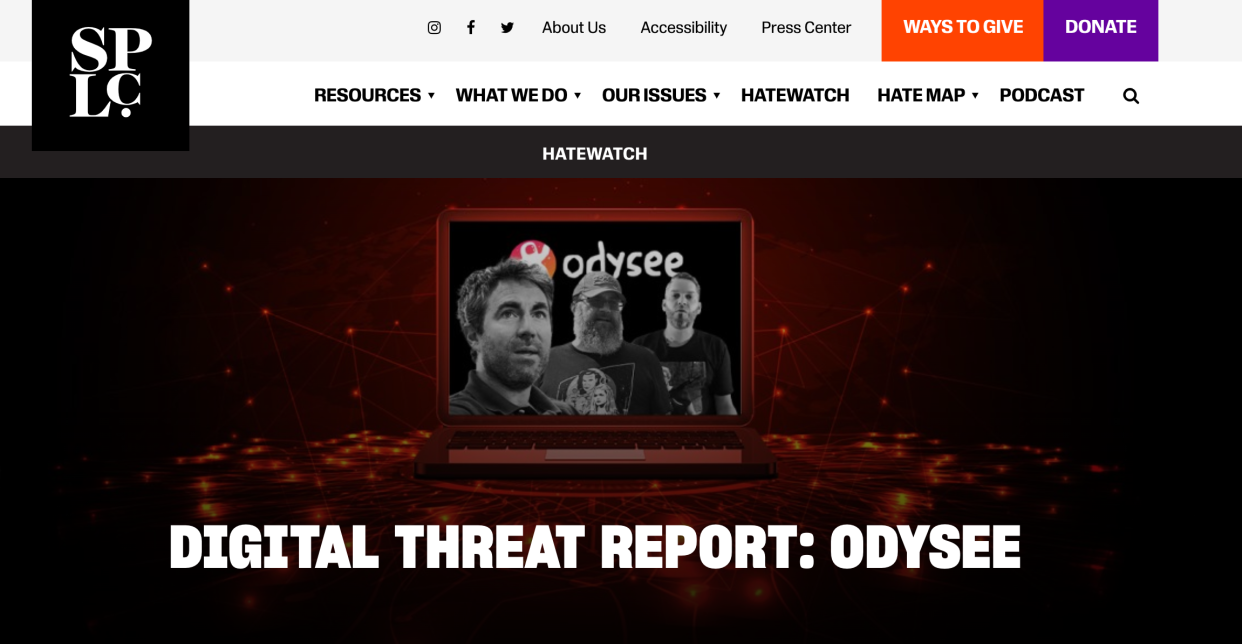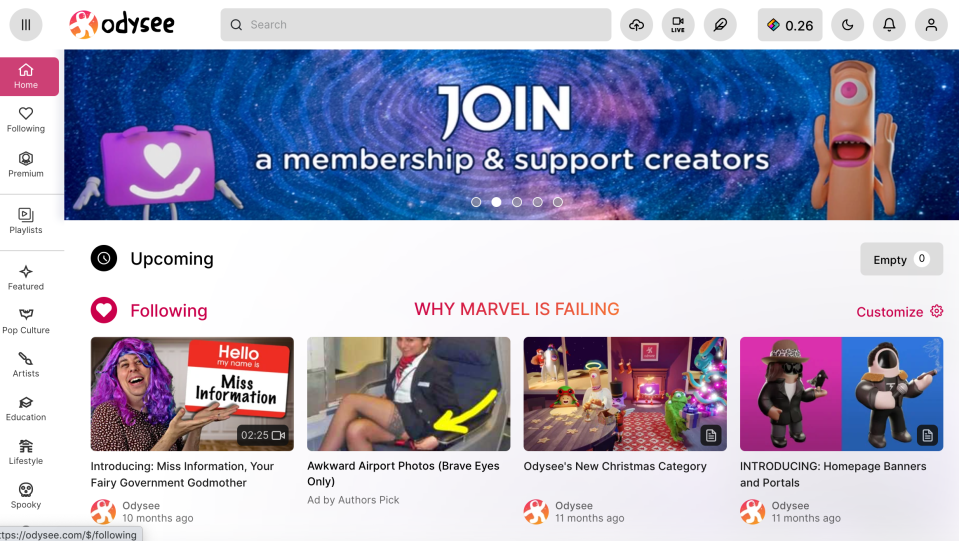It looks like a regular video-streaming site. It's fundraising for white supremacists, report says

- Oops!Something went wrong.Please try again later.
The online video-storage and livestreaming platform Odysee has become a haven for extremists, who are using the site’s cryptocurrency-based revenue system to rake in hundreds of thousands of dollars, researchers at the Southern Poverty Law Center found in a report shared exclusively with USA TODAY.
The law center’s inaugural Digital Threat Report, released publicly Tuesday, focuses on the video streaming website, which launched in 2020. The report is the first in a series of investigations of technology platforms that have been co-opted by extremists, which will be released in coming months by the center’s Intelligence Project.
The goal is to create a knowledge base about “alt-tech” websites popular with extremists and inform website users, parents and investors about the way the sites are being used. The effort is similar to the law center’s Extremist Files, which have long provided a catalog of information and data about extremist groups and individuals across the country, said Megan Squire, the center’s deputy director for data analytics.
“What I really wanted to do was focus on the tech and the platforms that are slipping by − they’re enabling extremism and fundraising, but people may not be aware of what they’re doing,” Squire said. “Say you see Odysee.com on your kid’s browser history − it just looks like a video-sharing website − you don’t realize that at any given moment they’re two clicks away from actual Nazi propaganda.”
Odysee did not respond to requests for comment. A request directly to one of the site’s founders drew no response.
What is Odysee?
Odysee is a video-sharing platform similar to YouTube, created as a subsidiary of the file-sharing site LBRY.com. It was founded by a group of Silicon Valley cryptocurrency enthusiasts including LBRY’s former CEO Jeremy Kauffman, according to the report.
Though the site’s interface is similar to YouTube’s, Odysee uses blockchain technology to host its videos instead of centralized servers controlled by one company, according to a 2021 report by the Global Network on Extremism & Technology.
The site says this makes videos “censorship resistant” because the files are not owned, held or controlled by a centralized company. In a 2019 blog post, Kauffman described LBRY as “ the most censorship-resistant system to ever exist.”

White supremacists and other extremists flocked to the platform to spread propaganda and hateful messaging, the law center's researchers found.
In 2021, Odysee was spun off from LBRY Inc. which ran afoul of the Securities and Exchange Commission for selling assets to investors but failing to file a registration statement with the agency. The SEC sued LBRY, eventually winning a judgment worth more than $111,000 against the company in July.
But Odysee continues to function, and the researchers found extremists have made a lot of money on the platform.
Extremists rake in cryptocurrency, and real dollars, on Odysee
When it comes to tracking extremists, Squire said, she has long been interested in the old adage to “follow the money.” On Odysee, her team tracked months of donations to known extremists worth hundreds of thousands of dollars.

“Odysee is also unique in the way it allows monetization of content through the use of a cryptocurrency called LBRY Credits (LBC),” the report says. “Content creators can receive payments in LBC based on such engagement metrics as the number of views their content has received.”
Those LBC could can then be converted into U.S. dollars, and Odysee users can also collect direct donations from followers who subscribe to their videos or by collecting one-time tips called “Hyperchat donations,” the report says.
Squire’s team collected publicly posted information from 165 extremist channels from April 24, 2021, to Aug. 31 of this year. The researchers concluded 113 of the channels received at least one Hyperchat donation and calculated that, combined, the channels raised $336,000 on the platform.
Among the biggest beneficiaries were a channel run by the author of a neo-fascist novel who also produced a film that promotes Great Replacement and White Genocide conspiracy theories and a channel run by one of the principals of a white supremacist podcast network, the report says.
About two months after the time frame examined by the law center's report, LBRY Inc. announced in a blog post that it was shutting down, citing the SEC ruling and “millions of dollars in debts.”
Extremists and 'alt-tech'
Jared Holt, a senior researcher at the Institute for Strategic Dialogue who studies extremist groups, said extremists are often among the first people to flock to a new tech platform, especially if it offers new ways to evade censorship and spread hateful propaganda.
“Technology evolves very quickly, and extremists have always been early adopters of emergent technologies,” Holt said. “Recently, that has included products and services that are often called ‘Web 3’ − things like cryptocurrency, different blockchain technology and ways of hosting content.”
As platforms have grown and developed, extremists often get pushed out by stricter content moderation, Holt said.
But with Odysee, that hasn’t happened.
The Odysee report is the law center’s inaugural Digital Threat Report and will be followed by similar papers outlining different platforms’ roles in the world of online hate, Squire said.
She said her team specifically aims to shine a light on websites that have become “havens” for extremists and whether extremists are being “enabled” by the companies or people running the site.
A former computer science professor, Squire has been scraping data on extremist groups and individual extremists for years, and she said she plans to bring the same data-driven approach to the Digital Threat Reports.
Holt welcomed the effort.
“Some of these sites succeed, some of them fail, but there’s always new ones popping up,” Holt said. ”Staying on top of those is invaluable.”
This article originally appeared on USA TODAY: Video-streaming site Odysee home to extremist crypto, new report finds

